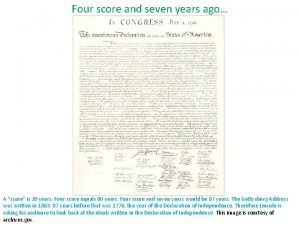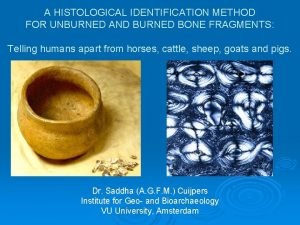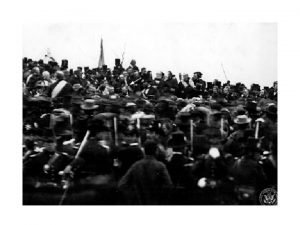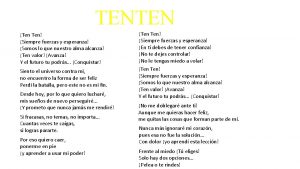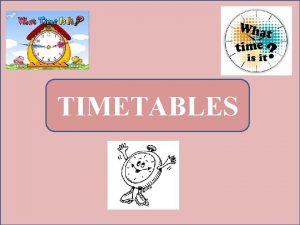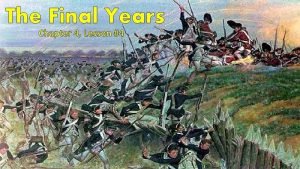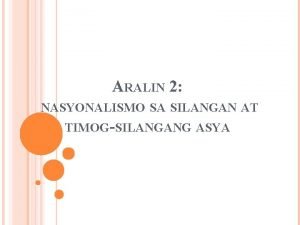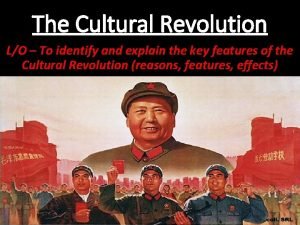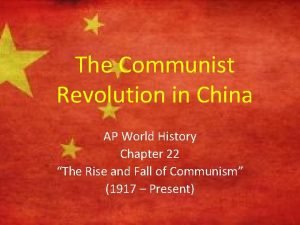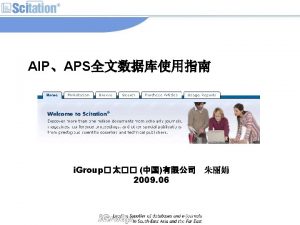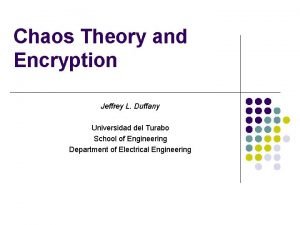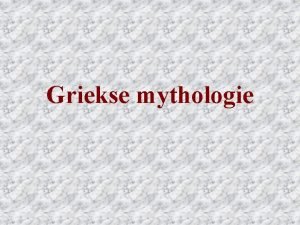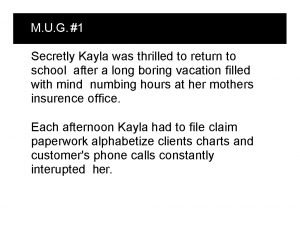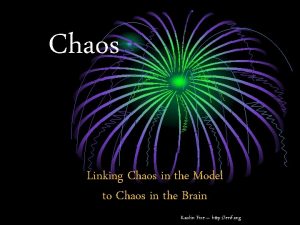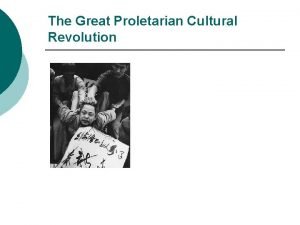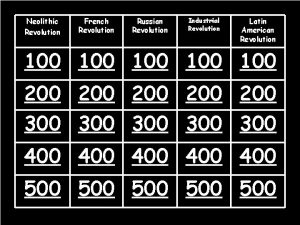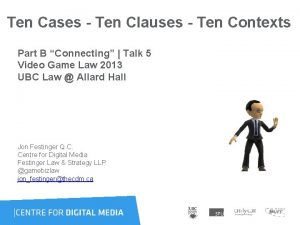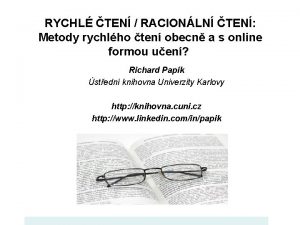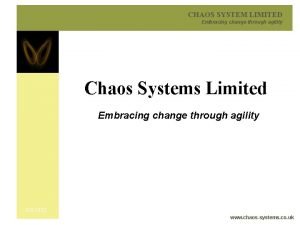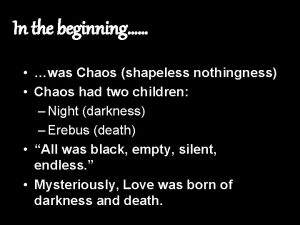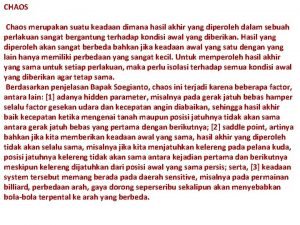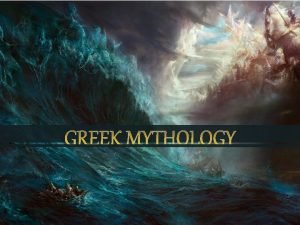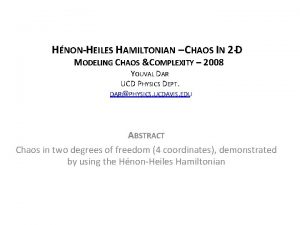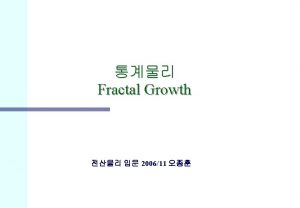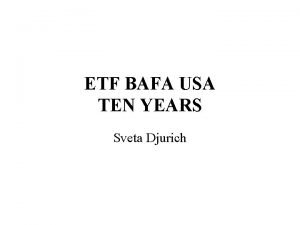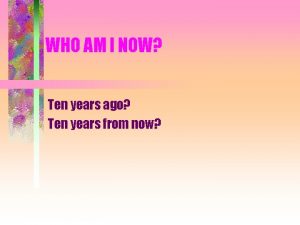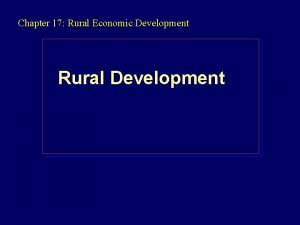The Cultural Revolution Ten Years of Chaos Rural

























- Slides: 25

The Cultural Revolution “Ten Years of Chaos” Rural Structure in China 1966— 1976


Background • The leadership of Mao thought that the party and the state of the Soviet Union was led by Khrushchev Revisionists. On the basis of theory of Mao put forward the so-called "four. ” The socialist society is quite a long historical stage. In this phase of history there was class contradictions and class struggle. There is socialism and capitalism, two roads that struggle. There is the danger of the restoration of capitalism, imperialism and the threat of social subversion along with imperialist aggression. As a result Mao developed in the "continuing revolution under the dictatorship of the proletariat theory"

Down to the Countryside( 上山下乡) People between the age of 45 to 60 years old are the “lost generation. ” They were sent down to the countryside and factories to work. These individuals encountered the brunt of Mao’s closure to the university system.

Mao sent millions of parents into labor camps and their children to the countryside; he forced families to abandon the privacy of their homes and to use communal kitchens and dorms. In Mao`s mind the children that were born in city should learn from a peasant. Maybe Mao disliked the red guard generation around with him? But what can those urban man can do? Younger intellectual individuals preformed labor with peasants and were forced to eat with them as well. Some also held reading seminars to learn Marx’s classic paper on communal society. While others learned math, science, and engineering because these majors were so practical. Although the normal exam served by the government had been pushed off, knowledge may be a consolation for the confused mind. During the movement some of peasants were selected to be Worker-Peasant-Soldier Students. Upon graduation the majority of them were assigned to the original units or provinces. A large number of them just knew how to fight with others, as a result they became the main force of antiintelligence.

Country Life Under Foreign Policy

• 7/14/1964 The communist party of China was informed that the Soviet union is no longer a socialist country, China is the antiimperialist against revisionism in the center of world revolution • From 1966 -1969 China's relations with the Soviet union became worse. Up until October 20, 1969 the Soviet Union had sino-soviet border troops. China carried out the "deep holes, accumulate grain" as a form of national preparedness


God building-A period of idol worship • The top leaders of the communist party of China received criticisms • In 1965 Lin Biao spoke and referred to "chairman Mao as a genius. ” He claimed that chairman Mao’s word is the truth. • In 1966 the ministry of education and education union jointly issued a notice of requirements on the national committee education. The front lifted living learning was a new upsurge of chairman Mao's works. Energy of the central committee of the communist party of China and the state council of state education ministry "about the 1966 -1966 degrees of the comments of the middle school politics, Chinese, and history textbooks of instruct report. ”


• In early January 1967 under the Zhang Chunqiao and Yao Wenyuan planning, The rebel group took the party and government leadership power of Shanghai. The power struggle was fully affirmed. In mid to late January the rebels seized the party and government leadership at all levels of "revolution. ” The Power surge once caused irremediable, quickly developed into "down with all the" comprehensive civil strife. • Among the older generations a revolution erupted in February of 1967, Ye Jianying, Xiangqian, and Nie Rongzhen adamantly opposed Chiang Ching and Philippine Marie Baudry. Chen Po-Ta preached that the army should take place in sports and shortly after it came under attack. • Factionalism fighting intensified comprehensive power. The rebel groups fought fierce with numerous disputes and conflicts and were considered the seeds of cruel warfare. In the summer and fall of 1967 Xie Fuzhi, Wang Li, Jiang Qing and others tried to put forward "by judicial organs and thoroughly smash method" and "tapping maggie wu wen" slogan to incite the warfare. British agencies were under fire for serious foreign events had taken place in Beijing. Within these few months the "cultural revolution" started since the country’s most violent unrest and social disaster progressed into the most serious stage.



• In Chinese history, especially in the Ming dynasty, the leader of the farmer movement Zhu Yuanzhang killed many of his ministers who once rebuilt the new state with him. • The cultural revolution let some historians to be associated with past things, The phenomenon of the personality cult prevails everywhere in China. What’s worse is that the basic human-rights had been a remote extravagant. • Some famous writers such as Fu Lei and Lao She are not allowed to stand with red-children. Suicide may be the only way to save a man’s dignity. In traditional China the intellectual individuals were respected if they returned back to their hometown, but now, where should they go to?


Anti- intellectualism “The mood in the country” • Some famous scholars were punished during this rebellion, they were forced to accept the self-thought-reform and confessed to new state that a proletariat is their new leader “people with no education may be the noble and purity. ” The leadership of Mao is said to revolve around Rousseau’s theory (famous philosophies with bad behavior in enlightenment stage). Wumi, a very famous scholar in Shangxi Province learned from Irving Babbitt, a humanist in the United States. He followed the guidance of the Confucius, Aristotle, and Buddha during the Cultural Revolution and eventually fell into despair. • When he had seen a ritual nation become so mad in his last tenyears dairy, he always asked himself “the world will be fine?” • Which eventually led to him introducing several books about intellectual persecution during cultural revolution.

He Introduced several books about intellectual persecution during the cultural revolution

A cultural revolution, and the defection of Lin biao - Lin Biao and Jiang Qing were two group leaders for a long time. Eventually accumulation of contradictions finally erupted, Mao Zedong saw Lin Biao and tried to kill his plot, Lin Biao chose to escape, and resulted in a plane crash - In January 1974, the nationwide "paying" movement. Mao Zedon launched a campaign to pay approval, not only because of Lin Biao privately admired Kongfuzi, and needed to borrow propaganda. Legalism insisted on change and criticism in the history of Confucianism and opposed the change to maintain the "cultural revolution"



• During the mayhem of the Cultural Revolution, countless historic buildings, including the oldest temple of Confucius, were destroyed as Red Guards declared their relentless disdain for the past. In our village there is a Xing-long Buddhist temple. I once heard from my grandfather and folk villagers that there were many pines for several hundred years, but at the beginning the Cultural Revolution those pines would be cut down. The temple was considered to be a stage to hold superstition so the Red Guards destroyed it. • The in temple last year my classmates and I had found some relics of the ancient temple, this stele is the historic relics of Xing-long Buddhist temple. Some pictures were photographed during this folk field research. The stele tells us a interesting story that on 180 years ago there are many that cherish the underground Xing-long Buddhist temple. Vangshunian, a China gentry who had passed the exam served by the government and achieved the laurel to be a minister of Qing dynasty. He connected with other gentleman in our village and advocated peasants around the castle to rebuild this temple to protect the feng-shui of a-ruined temple in pre-dynasty, and stimulated more and more people to be junzi (exemplary person). Maybe the exemplary person can get the cherish. A paradox phenomenon in Chinese history, recent years some relics recherished by villagers, and ashes of historic rubbish was sent to museums. Some trades research ancient relics to make landscapes. What an absurd thing!




 Ví dụ về giọng cùng tên
Ví dụ về giọng cùng tên Môn thể thao bắt đầu bằng chữ f
Môn thể thao bắt đầu bằng chữ f 300 solar years to lunar years
300 solar years to lunar years How long is four score and seven years
How long is four score and seven years Goat years to human years
Goat years to human years Once in ten years
Once in ten years Sredni vashtar summary
Sredni vashtar summary Four score and seven years ago our fathers
Four score and seven years ago our fathers Ajayan is ten years older than vijayan
Ajayan is ten years older than vijayan Ten ten siempre fuerzas y esperanza
Ten ten siempre fuerzas y esperanza Am i a 10/10
Am i a 10/10 Ten-twenty-thirty
Ten-twenty-thirty Lesson 4 the final years answer key
Lesson 4 the final years answer key Ama ng nasyonalismong tsino.
Ama ng nasyonalismong tsino. Did american revolution cause french revolution
Did american revolution cause french revolution Russian revolution vs french revolution
Russian revolution vs french revolution The third agricultural revolution
The third agricultural revolution Young mao
Young mao Cultural revolution
Cultural revolution Blibiography
Blibiography Cultural revolution definition ap world history
Cultural revolution definition ap world history Chaos greek mythology family tree
Chaos greek mythology family tree Chaos aip
Chaos aip Chaos theory and cryptology
Chaos theory and cryptology Griekse verhalen over goden
Griekse verhalen over goden When jake jammed the photocopier
When jake jammed the photocopier



